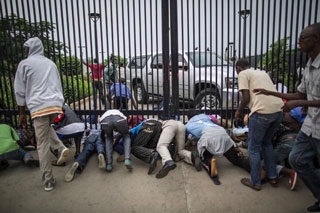A deep malaise grips Burundi in this electoral season. President Pierre Nkurunziza’s April decision to seek a third term in contravention of what many Burundians consider the intent of the Constitution threw the country into weeks of political and popular turmoil, leaving scores dead. Despite ardent domestic and international calls for a postponement of the elections, the President and his supporters are resolute: parliamentary elections compromised by gunshots, grenade attacks, and very low voter turnout were held on 29 June; presidential elections, in which Nkurunziza will be the ruling party’s candidate, are scheduled for 15 July.
 What current and historical factors have brought Burundi to this pass? What do these events augur for the country, which has so often and so tragically been shaken by political violence? What can be done—by Burundians and their friends and neighbours—to steer the country off the road to another civil war?
What current and historical factors have brought Burundi to this pass? What do these events augur for the country, which has so often and so tragically been shaken by political violence? What can be done—by Burundians and their friends and neighbours—to steer the country off the road to another civil war?
On July 7, 2015, the Nairobi Forum hosted a public panel of Burundi specialists to seek answers to these and other questions. Willy Nindorera, Bujumbura-based author and political analyst, was joined on the panel by Devon Curtis, Senior Lecturer in the Department of Politics and International Studies at the University of Cambridge, Alfred Nicayenzi, Chairman of the African Century Capital Group, and Aidan Russell, Assistant Professor of International History at the Graduate Institute of International and Development Studies, Geneva. The event was moderated by Maria Burnett of Human Rights Watch.
Moderator
Maria Burnett
Human Rights Watch
Panellists
Devon Curtis
Department of Politics and International Studies, University of Cambridge
Willy Nindorera
Author and Political Analyst
Alfred Nicayenzi
African Century Capital Group
Aidan Russell
Graduate Institute of International and Development Studies, Geneva



